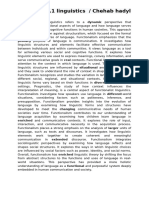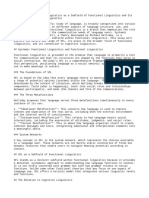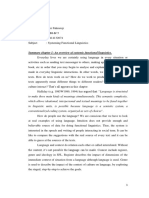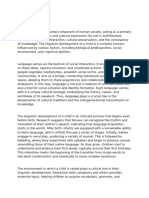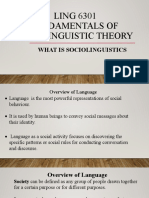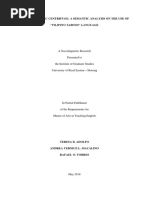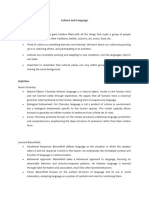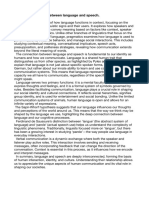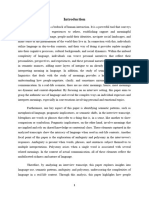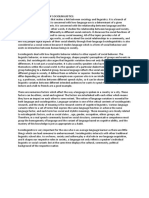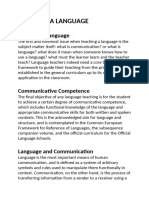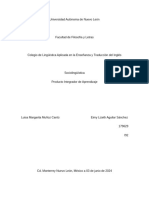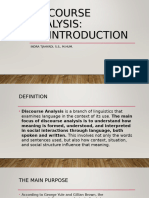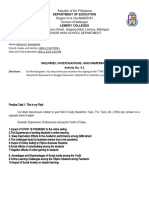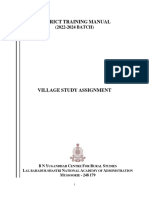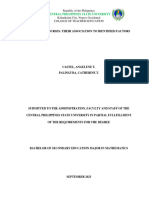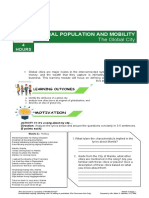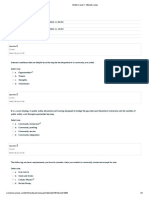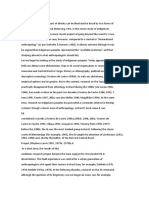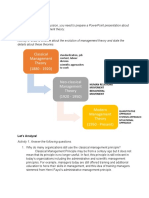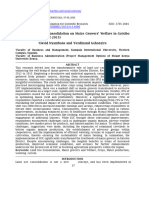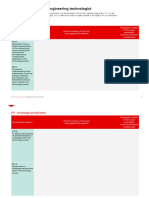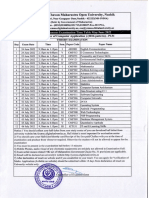0 ratings0% found this document useful (0 votes)
4 viewsACt 1
ACt 1
Uploaded by
chehabhadylCopyright:
© All Rights Reserved
Available Formats
Download as PDF, TXT or read online from Scribd
ACt 1
ACt 1
Uploaded by
chehabhadyl0 ratings0% found this document useful (0 votes)
4 views1 pageOriginal Title
ACt1
Copyright
© © All Rights Reserved
Available Formats
PDF, TXT or read online from Scribd
Share this document
Did you find this document useful?
Is this content inappropriate?
Copyright:
© All Rights Reserved
Available Formats
Download as PDF, TXT or read online from Scribd
Download as pdf or txt
0 ratings0% found this document useful (0 votes)
4 views1 pageACt 1
ACt 1
Uploaded by
chehabhadylCopyright:
© All Rights Reserved
Available Formats
Download as PDF, TXT or read online from Scribd
Download as pdf or txt
You are on page 1of 1
Summative.
1 linguistics / Chehab hadyl
Functionalism in linguistics refers to a dynamic perspective that emphasizes the
functional aspects of language and how language serves communicative and cognitive
functions in human societies. This approach emerged as a reaction against
structuralism, which focused on the formal and abstract structures of language.
Functionalism emphasizes that the primary purpose of language is communication. It
investigates how linguistic structures and elements facilitate effective communication
between individuals and within communities. It views language as a tool for achieving
various social and cognitive functions. It explores how linguistic elements are used to
express meanings, convey information, and serve communicative goals in real
contexts. Functional linguists pay close attention to the context in which language is
used. They analyze how linguistic structures are influenced by situational and cultural
factors, and they seek to understand the role of context in shaping language use.
Functionalism recognizes and studies the variation in language use across different
social, regional, and situational contexts. It examines how linguistic forms vary based
on their functions in diverse communicative settings. Pragmatics, the study of how
context influences the interpretation of meaning, is a central aspect of functionalist
linguistics. Functionalists investigate how speakers use language in different-world
situations, considering factors such as politeness, inference, and presupposition.
Functionalism provides insights into the evolution of language by examining how
linguistic forms and structures have developed to meet the changing communicative
needs of human societies over time. Functionalism contributes to our understanding of
language acquisition by examining how children learn language in enriched and
communicative contexts. It explores the role of input, interaction, and communicative
necessity in the acquisition process. Functionalism places a strong emphasis on the
analysis of larger units of language, such as texts and discourses. It investigates how
linguistic elements work together to create coherent and meaningful communication
in extended discourse. Functionalism integrates sociolinguistic perspectives by
examining how language reflects and shapes social structures. It explores the ways in
which linguistic choices are influenced by social factors such as power, identity, and
social norms. Overall, functionalism has enriched linguistic theory by shifting the focus
from abstract structures to the functions and uses of language in real-world
situations. This perspective has provided a more holistic understanding of language as
a functional and purposeful system deeply embedded in human communication and
society.
You might also like
- Sociolinguistics and Language TeachingFrom EverandSociolinguistics and Language TeachingRating: 1 out of 5 stars1/5 (1)
- Basic Methods of Linguistic AnalysisDocument4 pagesBasic Methods of Linguistic Analysismelaniacara83% (6)
- ACt 1Document1 pageACt 1chehabhadylNo ratings yet
- SummativeDocument1 pageSummativebosseyahkoubNo ratings yet
- Article 4Document3 pagesArticle 4Bandar AlmutairiNo ratings yet
- Handouts- SociolinguisticsDocument30 pagesHandouts- Sociolinguisticsartistzinou99No ratings yet
- Sociolinguistics CourseDocument39 pagesSociolinguistics Coursekheria1966sebahiNo ratings yet
- Final lingüísticaDocument13 pagesFinal lingüísticaCande MonterosNo ratings yet
- What Is Language and Its DevelopmentDocument12 pagesWhat Is Language and Its DevelopmentAbdul SamadNo ratings yet
- Sociolinguistics 5656Document20 pagesSociolinguistics 5656Shaukat Hussain Afridi100% (3)
- A. Concept Paper IIDocument6 pagesA. Concept Paper IIHanah MocoyNo ratings yet
- HomeworkDocument3 pagesHomeworkhatrachhihiNo ratings yet
- Language and PowerDocument84 pagesLanguage and PowerAdel EzzaouineNo ratings yet
- Schools of LinguisticsDocument14 pagesSchools of Linguisticsdhyousif845No ratings yet
- Critical Applied LinguisticsDocument13 pagesCritical Applied LinguisticsUzma ZahidNo ratings yet
- Sociolinguistics Notes 113Document36 pagesSociolinguistics Notes 113Faheem HyderNo ratings yet
- Summary Chapter 1: An Overview of Systemic Functional LinguisticsDocument2 pagesSummary Chapter 1: An Overview of Systemic Functional LinguisticsLindaNo ratings yet
- Noam Chomsky Chose To Study Language Autonomously, As A Self-Sufficient System. He Aimed ToDocument2 pagesNoam Chomsky Chose To Study Language Autonomously, As A Self-Sufficient System. He Aimed ToAmparo GomezNo ratings yet
- Language and Society SLA and Role of English Language in Pakistani SocietyDocument32 pagesLanguage and Society SLA and Role of English Language in Pakistani SocietymadajihwainsNo ratings yet
- LING 6301 Fundamentals of Sociolinguistics Theory. 1Document15 pagesLING 6301 Fundamentals of Sociolinguistics Theory. 1Shanae GriffithNo ratings yet
- 4TH Semester Ge-Eng Notes (Vaishnavi Nayak)Document23 pages4TH Semester Ge-Eng Notes (Vaishnavi Nayak)baishnabinayak316No ratings yet
- تكليفDocument5 pagesتكليفshahd ahmedNo ratings yet
- Lingui Mohammed DB16 - 071835Document19 pagesLingui Mohammed DB16 - 071835Elham Majeed QadirNo ratings yet
- Socioling ResearchDocument26 pagesSocioling ResearchTere AdolfoNo ratings yet
- UAS LinguisticsDocument9 pagesUAS LinguisticsGhina Nur Faridah RahmatNo ratings yet
- The Schools of Linguistics - Geneva SchoolDocument6 pagesThe Schools of Linguistics - Geneva Schoolbethelgospelmedia.zoom2020No ratings yet
- UNIV-ENGLISH Playlist on LinguisticsDocument8 pagesUNIV-ENGLISH Playlist on Linguisticsleandroabrantes3No ratings yet
- Rangkuman Interaksi Budaya Semester 7Document79 pagesRangkuman Interaksi Budaya Semester 7echaNo ratings yet
- Екзамен Зіставна ЛексикологіяDocument47 pagesЕкзамен Зіставна ЛексикологіяАнна ГорбуноваNo ratings yet
- Blank 2-1Document9 pagesBlank 2-1liit62079No ratings yet
- Lesson 1 Week 1 Intro To LinguisticsDocument8 pagesLesson 1 Week 1 Intro To LinguisticsJuan SiverioNo ratings yet
- Module One Introduction To The Applied Linguistics Lesson OneDocument9 pagesModule One Introduction To The Applied Linguistics Lesson OneYazmin TitoNo ratings yet
- Reflection Paper On Social ChangesDocument3 pagesReflection Paper On Social ChangesEstrella Janirol Humoc PiccioNo ratings yet
- FunctionalismDocument13 pagesFunctionalismhculloNo ratings yet
- Linguistics TypesDocument20 pagesLinguistics TypesN. ArjunNo ratings yet
- Sociolinguistics Notes FullDocument38 pagesSociolinguistics Notes FullKingNo ratings yet
- What Is LinguisticsDocument5 pagesWhat Is Linguisticsmonk3ydh3roNo ratings yet
- 1 Assignment No.3: Applied Linguistics: An IntroductionDocument15 pages1 Assignment No.3: Applied Linguistics: An IntroductionSajdah ImtiazNo ratings yet
- Sociolinguistics and TranslationDocument7 pagesSociolinguistics and TranslationKamilla PakNo ratings yet
- Academic Paper DraftDocument2 pagesAcademic Paper Draftvincerenier.delicanoNo ratings yet
- Psycho Linguistics, Sociolinguistics and Discourse AnalysisDocument33 pagesPsycho Linguistics, Sociolinguistics and Discourse AnalysisCA Sifuentes100% (2)
- Ethnographic Approach in Sociolinguistics ContextDocument3 pagesEthnographic Approach in Sociolinguistics Contextfadya faradiba50% (2)
- Applied Linguistics Anmar AhmedDocument4 pagesApplied Linguistics Anmar Ahmedanmar ahmedNo ratings yet
- Sosio 1Document8 pagesSosio 1Zenni WelzaNo ratings yet
- Scope and Significance of SociolinguisticsDocument1 pageScope and Significance of SociolinguisticsRida RanaNo ratings yet
- Teaching A LanguageDocument4 pagesTeaching A Languagediosadelsur1111No ratings yet
- General Linguistics ParagraphsDocument3 pagesGeneral Linguistics ParagraphsAhmed AouineNo ratings yet
- The Common European FrameworkDocument6 pagesThe Common European FrameworkleonelugbNo ratings yet
- Applied Linguistics - 045244Document26 pagesApplied Linguistics - 045244ximdraculaNo ratings yet
- PÍA SOCIOLINGUISTICA Analysis of Salma Hayek's SpeechDocument19 pagesPÍA SOCIOLINGUISTICA Analysis of Salma Hayek's SpeechEimy AguilarNo ratings yet
- LinguisticDocument7 pagesLinguisticfahmi tamannaNo ratings yet
- 314-Introduction To Linguistics-General ConceptsDocument7 pages314-Introduction To Linguistics-General Conceptsrahulns0310100% (1)
- Discourse AnalysisDocument36 pagesDiscourse AnalysisTesfu HettoNo ratings yet
- Tema 1 Ingles MaestrosDocument20 pagesTema 1 Ingles Maestrospbistue100% (2)
- Linguistic Approach by Sheena BernalDocument3 pagesLinguistic Approach by Sheena BernalSheEna BrnlNo ratings yet
- Linguistics 3rd YearDocument19 pagesLinguistics 3rd Yearkheria1966sebahiNo ratings yet
- Pertemuan 01 - Introduction To Discourse AnalysisDocument11 pagesPertemuan 01 - Introduction To Discourse AnalysisIndra TjahyadiNo ratings yet
- Discourse analysis applied to english language teaching in colombian contexts: theory and methodsFrom EverandDiscourse analysis applied to english language teaching in colombian contexts: theory and methodsNo ratings yet
- ReadinghabitsfullpaperDocument12 pagesReadinghabitsfullpapersri wahyuniNo ratings yet
- Activity 3.1Document2 pagesActivity 3.1Monica EvangelistaNo ratings yet
- The Challenges of Bioethics Nowadays: Smart Technology (CH5308701) Amalia Rizki Fauziah (M10806824) - Master StudentDocument3 pagesThe Challenges of Bioethics Nowadays: Smart Technology (CH5308701) Amalia Rizki Fauziah (M10806824) - Master StudentAmalia Rizki FauziahNo ratings yet
- NGSS PosterDocument1 pageNGSS PosterDaniel GaritaNo ratings yet
- Professional Learning Tool Planning For Learning - Ian SnyderDocument1 pageProfessional Learning Tool Planning For Learning - Ian Snyderapi-707741419No ratings yet
- Project Proposal TemplateDocument12 pagesProject Proposal TemplateNahom TafesseNo ratings yet
- Terminologies in Mental Health and Cause Risk Factors For Mental Illness in ChildrenDocument12 pagesTerminologies in Mental Health and Cause Risk Factors For Mental Illness in ChildrenadhikarisujataNo ratings yet
- Final Exam NotesDocument7 pagesFinal Exam NotesJesse FineNo ratings yet
- Village Study Assignment (2022-24 Batch) - Final - UpdatedDocument75 pagesVillage Study Assignment (2022-24 Batch) - Final - UpdatedSwapnil SisleNo ratings yet
- Classroom Allocations Morning Session (04!05!24)Document56 pagesClassroom Allocations Morning Session (04!05!24)eunicemama2004No ratings yet
- Cathy 021538Document32 pagesCathy 021538James Q. ConsularNo ratings yet
- Module 3Document20 pagesModule 3John MarkNo ratings yet
- Why'S Everyone On Tiktok Now? The Algorithmized Self and The Future of Self-Making On Social MediaDocument11 pagesWhy'S Everyone On Tiktok Now? The Algorithmized Self and The Future of Self-Making On Social MediacamilaNo ratings yet
- Thesis Framework SampleDocument10 pagesThesis Framework Samplesandragibsonnorman100% (2)
- NSTP2 - Midterm Quiz 1Document3 pagesNSTP2 - Midterm Quiz 1neiljohn geraldezNo ratings yet
- Ge1 Understanding The Self-1Document7 pagesGe1 Understanding The Self-1Khulyn Castro AlvarezNo ratings yet
- Crim 11 PPT 3Document16 pagesCrim 11 PPT 3MarvilyneNo ratings yet
- 620 Model of Cross Cultural Entry ForbeszellerDocument5 pages620 Model of Cross Cultural Entry Forbeszellerapi-516570361No ratings yet
- Radical AlterityDocument2 pagesRadical AlterityAlexandre VieiraNo ratings yet
- Cutmix: Regularization Strategy To Train Strong Classifiers With Localizable FeaturesDocument14 pagesCutmix: Regularization Strategy To Train Strong Classifiers With Localizable FeaturesDemon YouthNo ratings yet
- 7 Mistakes Even Great Leaders Make and What To Do Instead 1691506342Document11 pages7 Mistakes Even Great Leaders Make and What To Do Instead 1691506342rajuhsem100% (1)
- By Kelil Mohammed: Department of Computer Science Software Engineering (Cosc3061) Chapter OneDocument64 pagesBy Kelil Mohammed: Department of Computer Science Software Engineering (Cosc3061) Chapter Onekanenus collegeNo ratings yet
- Classical Management Theory (1880 - 1920) : Let's Check!Document2 pagesClassical Management Theory (1880 - 1920) : Let's Check!Jeremie VenterosoNo ratings yet
- Impact of Land Use Consolidation On Maize Growers' Welfare in Gatsibo District, Rwanda (2012-2015)Document14 pagesImpact of Land Use Consolidation On Maize Growers' Welfare in Gatsibo District, Rwanda (2012-2015)KIU PUBLICATION AND EXTENSIONNo ratings yet
- Summary Statement:: Engineering TechnologistDocument8 pagesSummary Statement:: Engineering TechnologistJayson Sarmiento100% (1)
- Advantages DSSSSSSDocument2 pagesAdvantages DSSSSSSPrecious Ndemwendemwene KapesiNo ratings yet
- P131-June2022 Exam TimeTableDocument1 pageP131-June2022 Exam TimeTableRaj MishraNo ratings yet
- Hartmann 1931Document12 pagesHartmann 1931Matheus Pereira CostaNo ratings yet
- Evaluation FormDocument2 pagesEvaluation Formxxsquishy99No ratings yet
- MSC - HRM - Anael Martin Moshi - 2013Document76 pagesMSC - HRM - Anael Martin Moshi - 2013Lweli LupondoNo ratings yet


